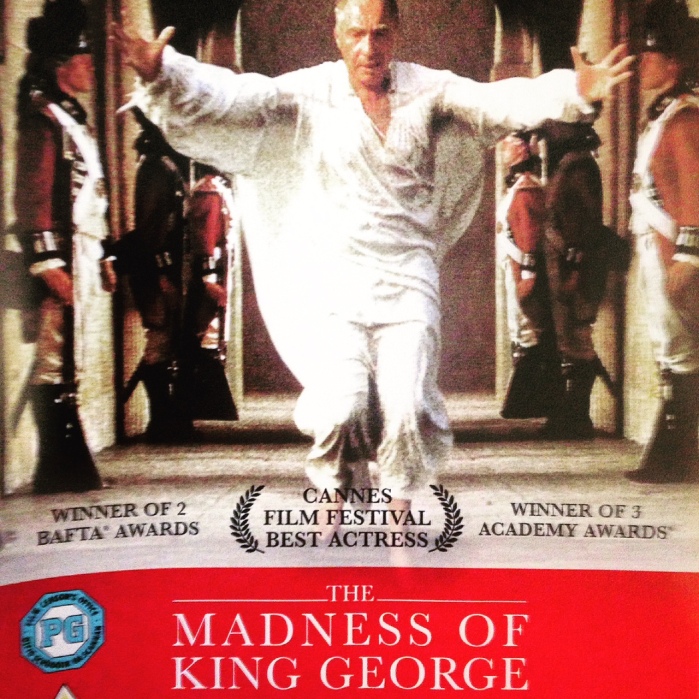
The Madness of King George, one of our favourite films, turned 20 earlier this year and we’ve decided to celebrate the fact.
It was adapted from Alan Bennett’s play and is based on the true story of King George III (1738-1820) and his bouts of manic dementia. As the King loses his mind, parliament panics and the conniving Prince George attempts to be made Regent – King in all but name.
Central to the whole thing is a quite incredible performance by Nigel Hawthorne as King George III. To put it mildly he encompasses the role to perfection – we’d lay down the claim it’s one of cinema’s all-time great performances.
As Hawthorne (who also starred in the BBC’s satirical series Yes Minister) died in late 2001, we feel this is a fitting tribute to the man, myth, and legend.
The Madness of King George
We have to state we’re anti-monarchy here at Professional Moron, as hereditary privilege seems somewhat anachronistic in this day and age.
By chance, the Madness of King George is a scathing assault on the absurdity of the monarchy system.
We should point out our sycophancy doesn’t derive from this – we thoroughly enjoyed the King’s Speech and that’s a pro-monarchy romp-along. It is, in its stance, rather anti-monarchy.
Why do we love the film so? It’s a rare combination of an endlessly witty and intelligent script (Bennett wrote the screenplay, and also has a momentary cameo at the film’s conclusion) combined with a dream cast.
They’re all at the top of their game, whether it’s Helen Mirren as the Queen, Rupert Graves (who’s since found fame in the BBC’s Sherlock TV series), John Wood as Lord Chancellor Thurlow , or Anthony Calf as the slippery Captain Fitzroy.
The film primarily centres around four characters. As the King loses his mind, the spoilt and thoroughly bored Prince George (Rupert Everett on fine, flamboyant form) begins to dream of becoming King and tasks MP Mr. Fox to claim him Regency.
Prime Minister Mr. Pitt (the now forgotten Julian Wadham delivering a standout performance) becomes concerned, and eager to hold onto his position drafts in the revolutionary Dr. Willis (Sir Ian Holm) to cure the King.
Nothing goes smoothly, everything is based around ridiculous pomp and ceremony, and what’s worse is the government is aware of it.
“God rot all Royals, give us the wisdom of America!” exclaims Mr. Fox after one of the Prince’s tantrums, which apparently drew a big roar of approval from American cinemagoers.
The Doctors Treating King George III
A special mention must go to all the doctors in this film. Sir Ian Holm leads the lot and is characteristically brilliant as the noble, innovative Dr. Willis.
But we also have Roger Hammond as the hilariously incompetent Dr. Baker, Geoffrey Palmer as the austere Dr. Warren, and Cyril Shaps as the likely senile, stool-obsessed Dr. Pepys.
The latter three are the first to attempt to cure the King’s often highly entertaining, but inherently tragic episodes.
The peak arrives at a public concert where in view of hundreds of guests, he almost sexually assaults the attractive Lady Pembroke, physically attacks Prince George, rambles incoherently, and disastrously joins in with the performance.
Dismissively seeking a cure, Dr. Warren arrogantly orders the King to be blistered to drive the evil spirits from his body (scolding hot glass is placed on the King’s extremities to do so), Dr. Pepys insists examining the King’s stools, and Dr. Baker prescribes a batch of senna, failing to realise the King will inevitably consume the lot.
To top it off, the King’s “water” turns blue. When this is pointed out to Dr. Baker, he exclaims:
“Medicine is a science, it consists of observation! Whether a man’s water is blue or not is neither here nor there.”
Dr. Willis is drafted in by Mr. Pitt in an attempt to bring some order to the chaos, and this initially results in utter carnage.
We highlight all of this as it’s central to the plot, but fascinating to behold.
This is how medics used to work, and you can read more about this on our Blood and Guts: A Short History of Medicine review of Roy Porter’s medical tome.
Watching The Madness of King George: Full Film
Okay, you’ll probably have to buy the DVD but it’s a super cheap one and can usually be picked up for about £5 (less than $10).
Totally worth it, dears, because this is a timeless slice of brilliance you do not wish to miss out on. You can also watch it above on YouTube!

I saw that movie on first release. It was a tremendous film although I have to confess that my envisioning of the Regency period is irrevocably framed by Prince ‘thick as a whale omelette’ George and his faithful butler Edmund Blackadder…
LikeLiked by 1 person
Indeed! Hugh Laurie delivered one almighty performance in Blackadder the Third. As well as in House. He’s a talented bloke.
LikeLiked by 1 person